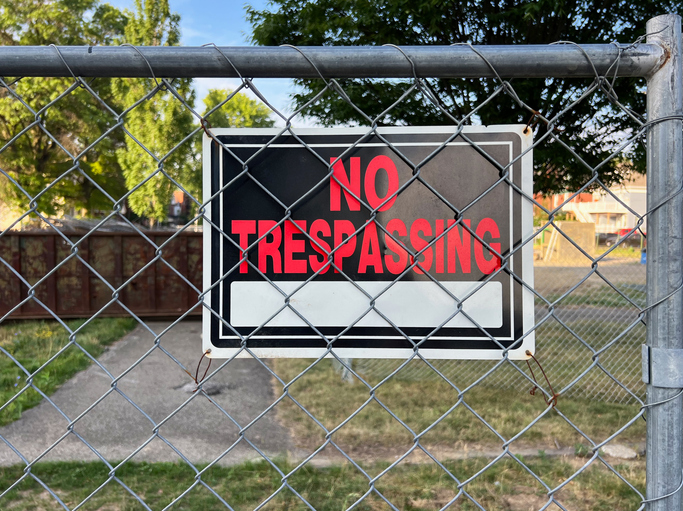Imagine you’re walking through a neighborhood shortcut or exploring a seemingly abandoned property, and suddenly, you’re approached by law enforcement. What seemed like an innocent act could quickly turn into a legal headache involving trespassing charges.
If you’ve been accused of trespassing in Florida, it’s crucial to understand exactly what the law says, the consequences you might face, and how you can build a solid defense. Here’s what you need to know about navigating trespassing charges in the Sunshine State.
What Is Trespassing in Florida?
Trespassing involves entering or remaining on someone else’s property without permission. Under Florida law (Section 810.08 and Section 810.09), trespassing can apply to private homes, businesses, and even land that may not seem “off-limits” at first glance.
Trespassing can fall into two major categories:
1. Trespass on Property Other Than a Structure or Conveyance
This type of trespassing occurs when someone enters privately owned land without the owner’s consent. Florida law often considers a piece of land “off-limits” if there are clear boundary markers, such as fences or “No Trespassing” signs.
Example: If you stray off a hiking trail and enter private farmland marked with “No Trespassing” signs, you’re violating the law—even if the land appears unoccupied.
2. Trespass in a Structure or Conveyance
This involves entering a building, home, vehicle, or similar structure without the owner’s permission. Even lingering inside a public place (like a store) after being asked to leave can lead to criminal trespassing charges.
Example: If you enter a parked RV without the owner’s permission or refuse to leave a restaurant when asked, you could face charges under this category.
Penalties for Trespassing in Florida
The severity of a trespassing charge depends on the circumstances of the offense. Here’s what you might be facing if you’re convicted:
Misdemeanor Trespassing
1. Second-Degree Misdemeanor
Entering land without permission or remaining after being asked to leave.
Penalties: Up to 60 days in jail, a $500 fine, or both.
2. First-Degree Misdemeanor
Entering or remaining in a structure or conveyance without permission.
Penalties: Up to 1 year in jail, a $1,000 fine, or both.
Felony Trespassing
Trespassing charges can escalate to a felony if aggravating factors are present, such as:
- Carrying a firearm or dangerous weapon during the trespass.
- Trespassing on certain restricted areas, like schools or utility facilities.
Third-Degree Felony
- Penalties: Up to 5 years in prison, a $5,000 fine, or both.
Common Situations That Lead to Trespassing Charges
Understanding how trespassing cases commonly arise can help you avoid sticky situations. Here are some real-life scenarios that might result in charges:
- Honor System Gone Wrong - You ignore or don’t notice a “No Trespassing” sign while hunting or fishing.
- Disputes Between Neighbors - You mistakenly step onto or refuse to leave a neighbor’s property during an argument.
- Unintentional Entry: You enter construction sites, warehouses, or abandoned buildings without realizing that the property is privately owned.
Unfortunately, ignorance is not a defense in many trespassing cases—it’s always best to assume private property is off-limits unless explicitly invited.
Legal Defenses to Trespassing Charges
If you’ve been charged with trespassing in Florida, don’t panic. A skilled attorney can evaluate your situation and determine the best course of action. Below are some common defenses that can help fight the charges:
1. Lack of “No Trespassing” Signs
If the property doesn’t have visible boundary markers or “No Trespassing” signs, it may not meet the legal definition of restricted access. Your charges could be dropped without proper notice that the land was private.
Example: You wander into an open field while on a bike ride, unaware it’s private property. If there are no visible warnings, your attorney may argue you couldn’t have reasonably known.
2. Permission Granted
You might avoid conviction if you believed in good faith that you had the property owner’s consent to enter or remain on the premises.
Example: A friend invites you to their pool party, but a neighbor mistakes you for a trespasser and alerts the police. Your lawyer can present evidence of the invitation.
3. Lack of Intent
Trespassing requires intentional entry onto another person’s property. If your presence on the property was accidental, the charges might not hold up in court.
Example: You mistakenly use a private driveway that looks like a public road and leave immediately after realizing the error.
4. Self-Defense or Necessity
If you entered the property to avoid harm or help someone in danger, this could serve as a defense under Florida law.
Example: You cut through a private lot to escape a dangerous stray animal. Your attorney could argue that entering the property was necessary for your safety.
5. Mistaken Identity
If law enforcement misidentifies you as the trespasser in question, your lawyer can present evidence proving you were not at the property when the incident occurred.
Example: You share the same name or physical description as someone seen illegally entering a property, but security footage clears you of involvement.
What to Do If You’re Facing Trespassing Charges
Facing trespassing charges can feel overwhelming, but an experienced defense attorney can help guide you through the process and fight to protect your rights. Here are steps to take if you find yourself in this situation:
- Gather Evidence - Write down everything you remember about the incident, including where you were, why you were there, and whether any signs were present.
- Avoid Speaking to Police Without Legal Counsel - Anything you say can be used against you, so it’s best to wait until your attorney is present.
- Contact an Attorney Quickly—A lawyer who specializes in trespassing cases will evaluate the evidence, explain your options, and build a defense strategy.
St. Augustine Misdemeanor Defense Attorney
Understanding the complexities of trespassing charges in Florida is essential for anyone navigating the legal landscape. From the legal definitions and types of charges to the potential consequences and defenses, being informed can make a significant difference in the outcome of a case. If you find yourself facing trespassing charges or have questions about property rights, seeking the guidance of a knowledgeable attorney is crucial. At Canan Law in Saint Augustine, FL, our experienced legal team is here to provide the support and expertise you need. Contact us today at (904) 849-2266 to learn more about how we can assist you with your legal needs.






